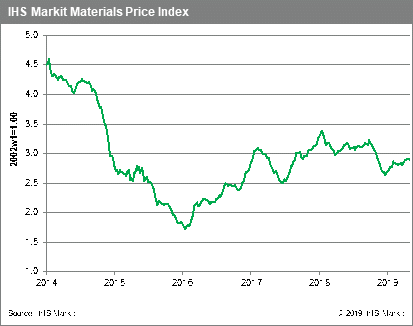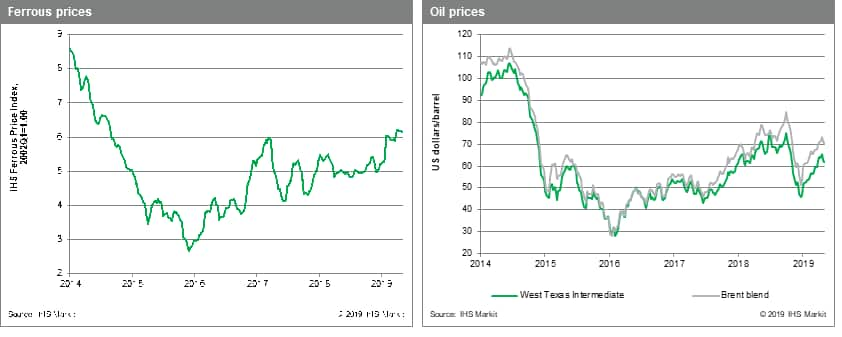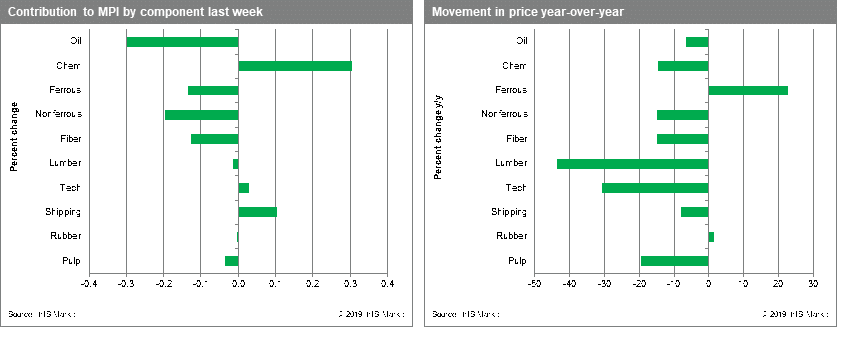Customer Logins
Obtain the data you need to make the most informed decisions by accessing our extensive portfolio of information, analytics, and expertise. Sign in to the product or service center of your choice.
Customer Logins
BLOG
May 15, 2019
Weekly Pricing Pulse: Negative sentiment increases as trade talks are derailed
As the 11th round of US-China trade talks ended, markets reacted poorly to the absence of a deal and the threat of an increase in tariffs. Commodities followed equity and bond markets lower, with our Materials price index dropping 0.4% for the week.

The fall in the MPI was broad based with seven of the MPI's ten
components retreating last week. Chemicals on the other hand moved
up for the fifth consecutive week by 1.7% as production capacity
remains shuttered in the US. Freight prices too showed a 3.4% gain
as bulk rates recover from the Q1 shock. Materials closely linked
to China suffered the most last week. Non-ferrous metals, for
example, fell 2.9%, their fifth consecutive weekly decline. Fiber
prices also lost ground, falling 2.1%. Chinese textile and fabric
imports are a particular target in the List 3 tariffs that will now
be increasing from 10% to 25%. Oil prices eased back again this
week by 1.6%, also because of trade related issues; however
supply-side issues effecting Iran and Venezuela are maintaining
pressure on crude and hence, we do not expect a sustained retreat
in prices until late 2019 or 2020.

The breakdown in US-China trade negotiations is forcing markets to
grapple with what could be a rupture in the world's largest and
most important trading relationship. The problem is complicated
because China is an important economic partner that has become
fully integrated into global supply chains. The danger now sending
a shudder through markets is that we may be looking at a process
that sees these two economies disengaging. Could conditions become
worse soon? A decision on 232 auto and auto parts tariffs is due
within a week.

{"items" : [
{"name":"share","enabled":true,"desc":"<strong>Share</strong>","mobdesc":"Share","options":[ {"name":"facebook","url":"https://www.facebook.com/sharer.php?u=http%3a%2f%2fwww.spglobal.com%2fmarketintelligence%2fen%2fmi%2fresearch-analysis%2fweekly-pricing-pulse-negative-sentiment-increases.html","enabled":true},{"name":"twitter","url":"https://twitter.com/intent/tweet?url=http%3a%2f%2fwww.spglobal.com%2fmarketintelligence%2fen%2fmi%2fresearch-analysis%2fweekly-pricing-pulse-negative-sentiment-increases.html&text=Weekly+Pricing+Pulse%3a+Negative+sentiment+increases+as+trade+talks+are+derailed+%7c+S%26P+Global+","enabled":true},{"name":"linkedin","url":"https://www.linkedin.com/sharing/share-offsite/?url=http%3a%2f%2fwww.spglobal.com%2fmarketintelligence%2fen%2fmi%2fresearch-analysis%2fweekly-pricing-pulse-negative-sentiment-increases.html","enabled":true},{"name":"email","url":"?subject=Weekly Pricing Pulse: Negative sentiment increases as trade talks are derailed | S&P Global &body=http%3a%2f%2fwww.spglobal.com%2fmarketintelligence%2fen%2fmi%2fresearch-analysis%2fweekly-pricing-pulse-negative-sentiment-increases.html","enabled":true},{"name":"whatsapp","url":"https://api.whatsapp.com/send?text=Weekly+Pricing+Pulse%3a+Negative+sentiment+increases+as+trade+talks+are+derailed+%7c+S%26P+Global+ http%3a%2f%2fwww.spglobal.com%2fmarketintelligence%2fen%2fmi%2fresearch-analysis%2fweekly-pricing-pulse-negative-sentiment-increases.html","enabled":true}]}, {"name":"rtt","enabled":true,"mobdesc":"Top"}
]}



